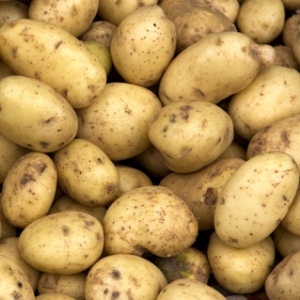
It is therefore quite surprising that allergens have now also been identified in potatoes.
New evidence
Evidence that the potato is not as hypoallergenic as was thought in the past is on the increase. Because potatoes are eaten throughout the world and form the staple food in many countries, this tuber had always been viewed as ‘safe’ for individuals suffering from food allergies.
Research shows that cooked potato is generally well tolerated, but some people do react to both raw and cooked potato.
What component in potato causes the allergic reactions?
Potatoes contain a wide variety of chemical compounds such as proteins, glycoproteins and alkaloids. Some of the allergens in potatoes are sensitive to heat, so if potatoes are cooked they no longer have the potential to cause a reaction.
Research studies have mainly concentrated on one protein called Sol t or patatin. This allergen can cause reactions such as eczema and has been implicated in atopic dermatitis.
The potato is a member of the Solanaceae family, which includes tomato, cherry, eggplant (aubergine), melon, pear, paprika, bell peppers, cayenne pepper, red pepper, tobacco and chili. A condition known as cross-reactivity can occur between the different members of a plant family. Thus a patient who is allergic or sensitive to tomato could also react to raw or cooked potato.
Generally speaking the cross-reactivity of this plant family is not high, but specifically tomato and potato both contain patatin and cross-reactivity can therefore occur between these two foods.
Sources of potato allergen
As mentioned above, both raw and cooked potato can cause allergic reactions in sensitive individuals. Allergic reactions can be triggered by eating potato, inhalation of potato ‘dust’ and exposure to raw, cut potato (workers in food processing plants), or inhalation of potato pollen (farm workers).
Symptoms of potato allergy
Exposure to potato allergens can cause a wide variety of symptoms:
- Nausea, vomiting, diarrhoea, abdominal pain, itchy mouth, swelling of the throat, the Oral Allergy Syndrome and throat pain
- Urticaria, swelling of the affected area, eczema, atopic dermatitis, contact dermatitis (itchy skin) when handling potato (peeling, etc at home or in factories)
- Runny nose, weepy eyes, sneezing, asthma, and tight chest
First exposure
Weaning foods often contain potato and infants may become sensitised at an early age. Some sensitised children only develop symptoms at a later stage.
‘Hidden sources’
Potatoes are used relatively extensively in a variety of foods, for example:
- Dried, powdered potato is used as a thickener in processed or canned foods
- Potato flour is added to cereals and is used in baking
- Potato is used in herbal medicines - the leaves for stomach upsets, the juice to treat peptic ulcers and some people apply raw potato to the skin
Besides these food-related uses, potatoes are also utilised to produce starch which is in turn used in treating cotton, and making industrial alcohol and certain alcoholic beverages (vodka is traditionally made from fermented potatoes).
Link with other allergic substances
Because potatoes tend to discolour and turn brown when they are cut and exposed to oxygen, potato products such as commercial or frozen chips are treated with the antioxidants, sulphite or metabisulphite. Anyone who is allergic to sulphur would thus react to this type of potato product, i.e. not to the potato allergens, but to the sulphur content. An asthma attack is generally the most serious reaction patients suffer when they are exposed to sulphides.
Solutions
If you suspect that you may be allergic to potato (e.g. you develop any of the above-mentioned symptoms when you handle raw potatoes or eat them cooked), you should discuss the problem with your general practitioner and have allergy tests done.
Self-diagnosis is self-defeating and can deprive you of valuable food sources. If you do test positive to potato, then you need to avoid eating and/or handling this food. It is also necessary to keep the other sources of potato in mind (flour in commercial products, herbal remedies etc.) and to read all food labels carefully.
Keep in mind that you may also react to tomatoes. Relatively speaking it is easier to avoid contact or ingestion of potato than many other allergenic foods and by doing so, you can avoid the unpleasant symptoms.
For those of you who are not allergic or sensitive to potato, this staple food remains a stalwart source of energy, vitamins and minerals. – (Dr I V van Heerden, DietDoc)




 Publications
Publications
 Partners
Partners











